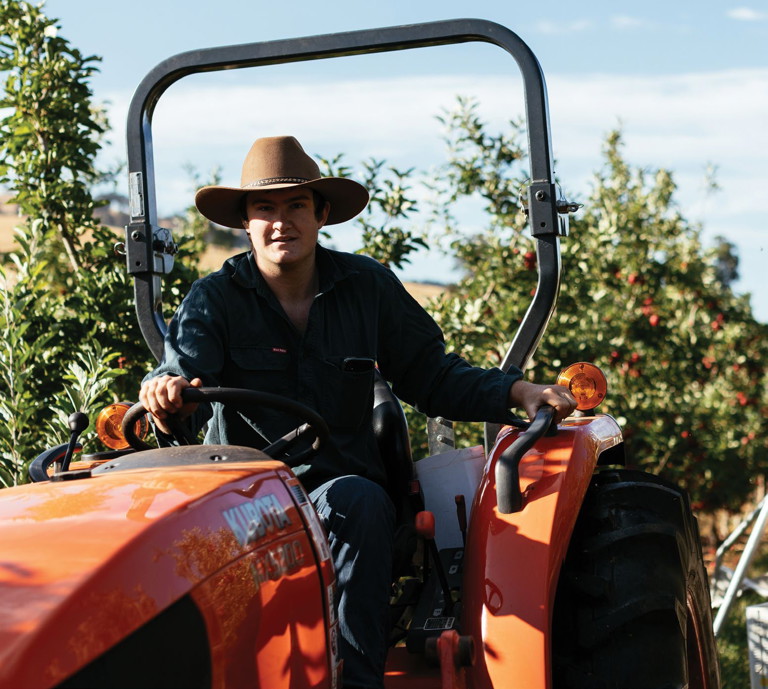UPFRONT discuss

How do we
attract the best
young minds
into Hort?
Four industry professionals share their
thoughts on how we can bring the best
talent into the horticulture industry.
As told to Anna Flanders Photography Frances Andrijich, Manus Stockdale, Victoria Baker courtesy Pomewest
“ The number one block to enticing the best minds into horticulture is salaries... mixed cropping/graingrowing industries are paying exceptional money ”
James Scott, 20 years
Grower, Nannup Fresh Fruit
I GREW up on our mixed orchard and beef property. I have been working on the farm now for three years fulltime, as well as doing some soil testing and course facilitation. I have studied a Diploma in Agriculture, majoring in beef cattle production through RuralBiz, which is based in Dubbo, NSW.
My only option was to major in beef cattle or grain. If horticulture were offered as a major I would have done that. Locally, TAFE offers a horticultural course, but that is more based around city gardening, landscaping and lawn maintenance. The industry needs to assist in developing something like an irrigated production horticulture course, which touches upon truly relevant material, rather than a modified agriculture or horticulture course.
The number one block to enticing the best minds into horticulture is salaries. Corporate agriculture, especially in the mixed cropping/ grain-growing industries, are paying exceptional money compared to what horticulture is currently paying. At the moment, our margins compared to those of the mixed croppers/ grain growers are significantly lower. So, our ability to pay for good managers isn’t as high. I’m drawing comparisons to those other industries here because they are our main competitors in enticing young minds who have studied agricultural science or business into horticulture. We need to pay a sustainable price for staff. However, we can’t get to the point of having better production, which then brings better buying power, without having better people. It’s a vicious cycle that we are currently stuck in.
Another factor is the hours we work. In some areas of horticulture, the hours are much higher than those in other industries. Some agronomists in the Wheatbelt work seven months of the year and earn enough in that seven months to not work for the remaining five. But within horticulture, it’s 12 months. That’s unavoidable. But, again, it comes back to paying the right money to encourage people to take on that workload. It’s great when young professionals have a passion for horticulture, but it can become a hard sell when we are not paying as much. Then, of course, as a farm manager/ business owner, there is a greater workload, as well as the greater expectation to make good, profitable decisions. For this you need clear thinking time, something that can sometimes be frustratingly lacking in horticulture.
Exposure would help entice more people into hort. We need to promote it as an attractive industry that provides a strong future within it. I know of only one other guy aged between 20 and 30 coming through as a future fruit grower in the whole of Western Australia. If there are more young growers, great. But there hasn’t even been enough exposure to each other within our local industries for us to know. Then there’s the support staff around irrigated horticulture: we are attracting very few people in that area, other than those provided by corporate agricultural supply-based businesses. Our main consultant, who travels into WA from QLD, is 64 years of age. There is currently no-one to replace him.
Another problem to overcome is a negative public image and, to some extent, public license. Both veggies and orchards have been hit with a good amount of negative publicly. Now, some of this is unfortunately true, however there has been a lack of promotion from our industries defending ourselves. Take the underpayment of wages accusations. We all know there have been people doing the wrong thing, we can admit that. However, there has been no promotion of programs, such as Fair Farms, that are designed to stop any wrongdoing in that area. Producers are using these programs, so why not use this to try to change some public perception?
Strong promotion, getting truth into mainstream media and looking at how we can overcome the salary gap between hort and the grains and sheep industries are key. However, getting a horticulture course up and running in WA is also important. There’s no doubt about that. If you’ve got people who have potential within the industry, it allows them to escalate their knowledge within business as time goes on. I do see with some hope that the Northam-based Muresk Institute has been turned into a technology hub for agriculture. I hope that they consider introducing a horticulture course as part of their agtech offerings.

Stephen Brown
CEO, vegetablesWA
OUR focus as an industry body is on middle managers – the people who we can train, who have already gained some form of training through a college or who have hands-on experience and want to stay in the industry to develop a career.
We have identified a need to speak directly with students at high school, where they are considering their future and career. Our message is that horticulture is an exciting career with many pathways and opportunities. It’s no longer about sloshing around in mud and dirt all day. Most crops are planted by machinery, they’re harvested by machinery and they’re processed by machinery. There are roles across a wide range of career options, such as agronomy, engineering, irrigation, research and development, quality assurance, sales and marketing, biosecurity, operations, logistics, production and more.
Our national body AUSVEG has recognised this and invested in a Growing a Career in Horticulture book with online downloads, teacher supports and videos. We at vegetablesWA are working with the South West TAFE, Carnarvon TAFE, agriculture colleges and regional high schools to introduce people to horticulture through open days, careers days and a farm visit program. We are educating students on where the food they eat is produced and all the steps to delivering it to the supermarket.
This initiative to create more exposure around the horticulture industry is based mainly in regional areas. Our belief is that by attracting the younger generation who are already in these growing zones, the students can enter horticulture and horticultural studies in a familiar environment with a strong friend and family support network around them. They can also enter a career where their lifestyle – social, sport, wellbeing – is already established and can continue.

Pennie Patane
Grower, Patane Produce
WE are working in a market that is constantly asking us to drop our prices. Our state is focused on mining and FIFO work. Our industry is not valued by politicians and the general public.
Over the past few years, I have been working with students to introduce them to horticulture. However, I have school children on my farm tours commenting at Year 9 that they are going to go FIFO and their parents are encouraging this. My thoughts on how to fix this are expensive – we need to create a national campaign, such as lamb has done, and which rice and the mushroom industry have done, too.
The horticulture industry has an image problem. We need to develop an identity. We need to work out what we can offer and publicise it. We need to invest in getting our message out to parents, teachers, schools (at all levels), students and the general public. We need to address the bad reputation that has been promoted in the media. And promote those who are doing the right things.
We also need to look within our own businesses to see how we can change our structures to include more skilled roles. Perhaps with help from industry bodies, we can bring in graduates and look to restructure our businesses to include more middle management.
It’s also important that we publicise the appealing aspects of the horticulture industry, such as: our fast-evolving move into the tech space; role diversity – no two days are ever the same (unless you’re on a really big farm); we are an essential industry, so have stability; and there’s a moral aspect to it – we’re growing food to feed people. We’re not producing wine so you can have a good time. We’re producing what’s needed to survive.

Patrick Fox
Grower, Fox Farming
WA Potatoes has initiated a ‘Seeds for Schools’ program. We need to implement this on a grass roots level from the broader horticulture sector to encourage youth to be involved in the industry or, at bare minimum, teach them the value behind where food comes from, the work involved and the adversity that can affect an industry and consumers.
We need to continue the promotion of this through both primary and secondary school, informing the youth of the broad range and diversity of jobs within the sector. Gone are the days of hard slog; technology has vastly improved. With mechanisation, manual labour is more a thing of the past, and innovative farming practices are being implemented, such as drone farming and next-generation technologies.
As a primary producer, one of our main challenges is being able to afford to pay high-income wages so we can retain high-quality/skilled staff and attract new skilled staff into the sector. Horticulture businesses don’t operate on high percentage profit margins. If primary producers were able to increase sale price to increase profit margins or, alternatively, if there were rebates awarded to primary producers for some high cost expenses, we could afford to attract highly skilled quality staff into the sector.
Additionally, the horticulture industry’s peak bodies could offer scholarships to encourage or entice academic-driven youth into the sector. I have seen some small-volume, niche industry bodies do this.
All this goes towards showcasing the stereotypical practices, which were once viewed as back breaking, boring or mundane, are a thing of the past. It would change public perception by: informing on industry growth; the importance of food security; how new technologies/skills are being used and relied on; and the vast opportunities within the hort industry.